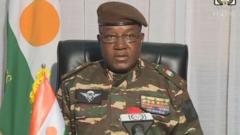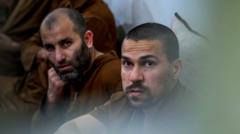Tensions in West Africa escalate as accusations fly between Nigeria and Niger, with each nation's leadership offering starkly opposing perspectives on the matter.
**Niger's Accusations Against Nigeria: A Deepening Crisis in West Africa**

**Niger's Accusations Against Nigeria: A Deepening Crisis in West Africa**
Niger's military leader claims Nigeria is colluding with France to destabilize Niger, a charge Nigeria firmly rejects.
---
Niger's military leader, Brigadier General Abdourahmane Tchiani, has leveled serious accusations against Nigeria, alleging that it is collaborating with France to undermine Niger's stability. In a Christmas Day interview, Tchiani accused France of forming alliances with militant groups operating in the Lake Chad region, an effort that he claims is being conducted with the tacit approval of Nigerian authorities.
"Nigerian authorities are not unaware of this underhanded move," Tchiani stated, stirring diplomatic tensions that have already been strained since last year’s military coup that ousted former President Mohamed Bazoum. However, Nigeria has vehemently denied these allegations. National Security Adviser Nuhu Ribadu labeled the claims as "baseless" and "false," asserting that Nigeria would never sabotage Niger.
Minister of Information, Mohammed Idris, echoed this sentiment by suggesting that the accusations are merely a distraction from the failures of Tchiani's administration. He characterized the claims as existing "solely in the realm of imagination" and firmly denied any partnerships aimed at destabilizing Niger.
The rising accusations have compounded the existing diplomatic strain between the two countries. The Economic Community of West African States (Ecowas), led by Nigerian President Bola Tinubu, had previously imposed economic sanctions on Niger following the coup. In a show of unity, Ecowas issued a statement on Thursday refuting Niger's claims. The regional bloc emphasized Nigeria's long-standing commitment to peace and security across West Africa and dismissed any notion that the nation would engage in sponsorship of terrorism.
The conflict takes on greater significance as it unfolds within the backdrop of geopolitical maneuvering in the region. Since the coup, Niger's government has called for the withdrawal of French military bases and has sought alliances with neighboring nations, particularly Mali and Burkina Faso. The backdrop of this dispute raises questions regarding the future of stability in West Africa and the potential for wider conflict in an already turbulent region.
Niger's military leader, Brigadier General Abdourahmane Tchiani, has leveled serious accusations against Nigeria, alleging that it is collaborating with France to undermine Niger's stability. In a Christmas Day interview, Tchiani accused France of forming alliances with militant groups operating in the Lake Chad region, an effort that he claims is being conducted with the tacit approval of Nigerian authorities.
"Nigerian authorities are not unaware of this underhanded move," Tchiani stated, stirring diplomatic tensions that have already been strained since last year’s military coup that ousted former President Mohamed Bazoum. However, Nigeria has vehemently denied these allegations. National Security Adviser Nuhu Ribadu labeled the claims as "baseless" and "false," asserting that Nigeria would never sabotage Niger.
Minister of Information, Mohammed Idris, echoed this sentiment by suggesting that the accusations are merely a distraction from the failures of Tchiani's administration. He characterized the claims as existing "solely in the realm of imagination" and firmly denied any partnerships aimed at destabilizing Niger.
The rising accusations have compounded the existing diplomatic strain between the two countries. The Economic Community of West African States (Ecowas), led by Nigerian President Bola Tinubu, had previously imposed economic sanctions on Niger following the coup. In a show of unity, Ecowas issued a statement on Thursday refuting Niger's claims. The regional bloc emphasized Nigeria's long-standing commitment to peace and security across West Africa and dismissed any notion that the nation would engage in sponsorship of terrorism.
The conflict takes on greater significance as it unfolds within the backdrop of geopolitical maneuvering in the region. Since the coup, Niger's government has called for the withdrawal of French military bases and has sought alliances with neighboring nations, particularly Mali and Burkina Faso. The backdrop of this dispute raises questions regarding the future of stability in West Africa and the potential for wider conflict in an already turbulent region.




















